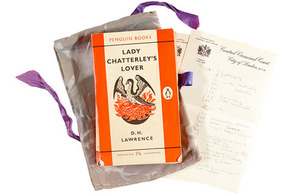
Lady Chatterley's Lover
- Annotated work contains notes made by wife of judge who oversaw famous 1960 obscenity trial .
- Temporary export bar has been issued to try to keep the copy in the country.
The annotated copy of Lady Chatterley's Lover used by the judge who presided over the 1960 obscenity trial is at risk of leaving the UK unless a buyer can be found to match the £56,250 asking price.
Lady Chatterley's Lover was D. H. Lawrence's final novel before his death in 1930. While it was published privately in Florence in 1928 and in France the following year, the book was not published in full in Britain until 1960 due to fear of prosecution. Its eventual publication led to the trial in which this particular copy played a significant role.
The book was owned by Sir Laurence Byrne, the judge who presided over the now famous obscenity trial. It contains annotations and two pages of notes with a list of page numbers with short content summaries. The principal hand is that of Byrne's wife Dorothy, who had studied the book and prepared a list of the pages she had annotated. Later notes have been made by the judge himself during the trial. Dorothy also sewed a blue-grey fabric bag for her husband to carry the book to and from court.
In 1960, Penguin Books decided to publish the uncensored work to test the 1959 Obscene Publications Act, which was designed to protect works of literature while strengthening laws against pornography. Potentially obscene works could now be published if they were of literary merit or contributed to the public good.
The trial of Lady Chatterley's Lover was a sensation with the acquittal of Penguin viewed as a landmark moment in cultural history. The trial's drama, its class tensions and its explicit references to sex captured the public's attention. After the trial, Penguin quickly sold 3 million copies.
Arts Minister Michael Ellis said:
The trial of Lady Chatterley's Lover captured the public attention in 1960. It was a watershed moment in cultural history, when Victorian ideals were overtaken by a more modern attitude. I hope that a buyer can be found to keep this important part of our nation's history in the UK.
Chairman of the RCEWA, Sir Hayden Phillips, said:
The prosecution of Penguin Books for publishing Lady Chatterley's Lover was one of the most important criminal trials of the 20th century. Judge Byrne's copy of the novel, annotated by him and his wife, may be the last surviving contemporary 'witness' who took part in the proceedings.
Picture the scene: the High Court Judge presiding in his red robes, his wife beside him on the Bench (as was allowed in those days) as a succession of singular and distinguished witnesses for the Defence were cross examined day by day. I was 17 at the time and studying a DH Lawrence as a set text for A Levels - it was not Lady Chatterley's Lover, but at least I could follow the riveting course of the trial in the daily papers. It would be more than sad, it would be a misfortune, if this last surviving 'witness' left our shores.
The Reviewing Committee on the Export of Works of Art and Objects of Cultural Interest (RCEWA) made its recommendation on the grounds that the departure of the book from the UK would be a misfortune because of its close connection to our history and national life.
The decision on the export licence application for the book will be deferred until 9 August 2019. This may be extended until 9 October 2019 if a serious intention to raise funds to purchase the item is made at the recommended price of £56,250.
ENDS
Notes
- Organisations or individuals interested in purchasing the items should contact the RCEWA on 0845 300 6200.
-
Details of the book are as follows: DAVID HERBERT LAWRENCE, 1885-1930 LADY CHATTERLEY'S LOVER HARMONDSWORTH: PENGUIN, 1960, first impression 8vo, original decorated paper wrappers, THE JUDGE'S COPY FROM THE 1960 OBSCENITY TRIAL, ANNOTATED FOR HIM BY HIS WIFE, c.118 pages containing pencil markings, underlining, and occasional marginal notes (names of characters etc.), also with a list of significant passages ("love making", "coarse", etc.) with page numbers loosely inserted (four pages, 8vo, on headed stationery of the Central Criminal Court), housed in a blue-grey damask bag with blue ribbon tie, spine chipped at foot, text block partially detached from spine, paper clip with rust mark on lower wrapper
-
Provenance: It belonged to the family of the judge who originally owned the book until sold at Sotheby's, London, 13 December 1993, lot 137 where bought by Christopher Cone & Stanley J Seeger until sold at Sotheby's, London, 30 October 2018, lot 159
-
The Reviewing Committee on the Export of Works of Art and Objects of Cultural Interest is an independent body, serviced by The Arts Council, which advises the Secretary of State for Digital, Culture, Media and Sport on whether a cultural object, intended for export, is of national importance under specified criteria.
- The Arts Council champions, develops and invests in artistic and cultural experiences that enrich people's lives. It supports a range of activities across the arts, museums and libraries - from theatre to digital art, reading to dance, music to literature, and crafts to collections. www.artscouncil.org.uk.






